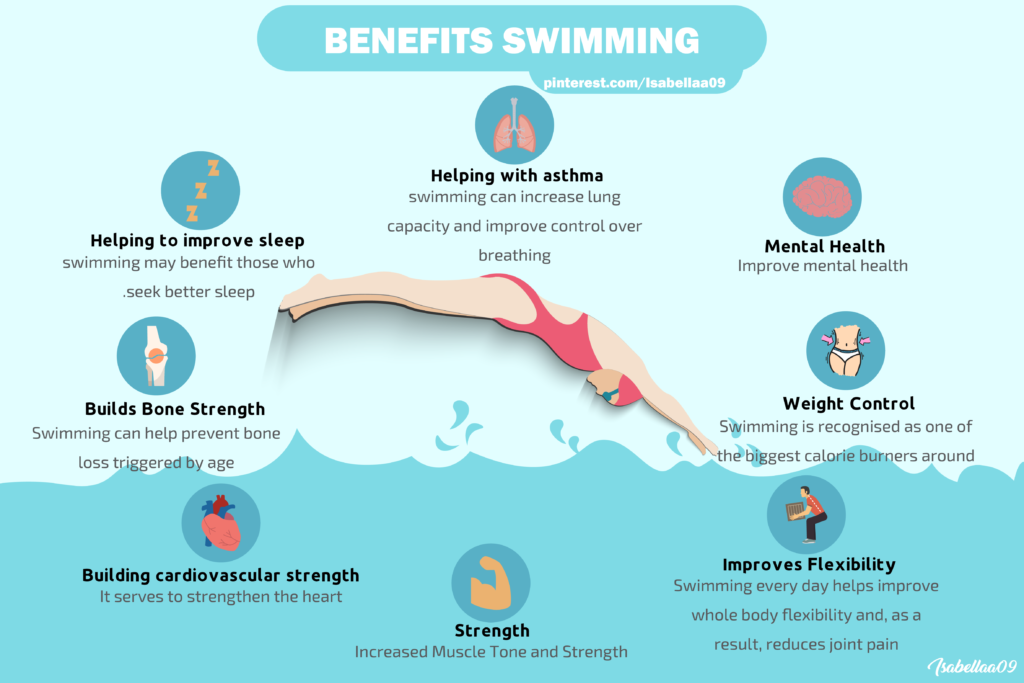
Swimming, a timeless aquatic pursuit, offers a plethora of health benefits that extend far beyond its recreational appeal. From boosting cardiovascular health to enhancing mental well-being, this low-impact exercise has become a popular choice for individuals of all ages and fitness levels. In this comprehensive exploration, we delve into the myriad advantages of swimming, uncovering why it stands as a superior fitness regimen.
A Full-Body Workout
Unlike many land-based exercises, swimming engages nearly every major muscle group in your body. As you glide through the water, your arms, legs, core, and back work in harmony, providing a comprehensive workout that leaves no muscle untouched. This holistic approach to fitness ensures balanced development and helps prevent imbalances that can lead to injuries.
Low-Impact, High-Reward
One of the most significant advantages of swimming is its low-impact nature. The buoyancy of water reduces stress on your joints, making it an ideal exercise for individuals with arthritis, joint pain, or injuries. This gentle yet effective workout allows you to maintain your fitness goals without exacerbating existing conditions.
Cardiovascular Fitness

Swimming is an excellent cardiovascular exercise that helps strengthen your heart and lungs. As you swim, your heart rate increases, pumping blood more efficiently throughout your body. Regular swimming can lower your risk of heart disease, stroke, and other cardiovascular ailments.
Improved Mental Health
Beyond physical benefits, swimming has a profound impact on mental health. The rhythmic nature of swimming can induce a meditative state, reducing stress and anxiety. The soothing sounds of water and the feeling of weightlessness can promote relaxation and improve overall mood. Additionally, swimming can boost self-esteem and body image, as it helps you achieve fitness goals and feel more confident in your body.
Enhanced Flexibility and Balance
The fluid movements required for swimming contribute to improved flexibility and balance. As you stretch and extend your limbs in the water, your muscles become more supple and your range of motion increases. This enhanced flexibility can help prevent injuries and improve your overall performance in other physical activities.
Weight Management

Swimming is an effective tool for weight management. The water resistance provides a challenging workout that burns calories and helps you shed excess pounds. Additionally, the low-impact nature of swimming reduces the risk of injuries that might hinder your weight loss journey.
Therapeutic Benefits
Swimming has therapeutic benefits for individuals with certain medical conditions. For example, people with arthritis often find relief from joint pain and stiffness through aquatic therapy. Water-based exercises can also help individuals with multiple sclerosis, fibromyalgia, and other chronic conditions improve their mobility and reduce symptoms.
Safe and Accessible
Swimming is a relatively safe form of exercise when practiced in a controlled environment. Unlike land-based activities, the risk of falls and impact injuries is significantly reduced in water. Moreover, swimming pools are accessible to people of all ages and fitness levels, making it a convenient and inclusive exercise option.
Conclusion
Swimming offers a holistic approach to fitness, combining physical and mental health benefits. Whether you’re a seasoned swimmer or a beginner, incorporating swimming into your routine can have a positive impact on your overall well-being. So, take the plunge and discover the transformative power of this aquatic exercise.Sources and related content

Your point of view caught my eye and was very interesting. Thanks. I have a question for you.